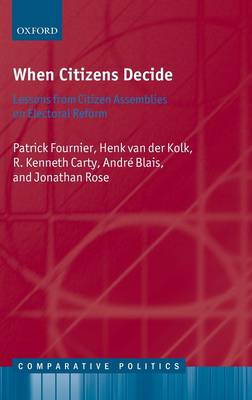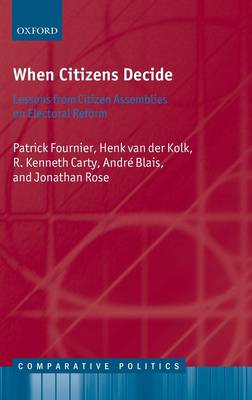
- Retrait gratuit dans votre magasin Club
- 7.000.000 titres dans notre catalogue
- Payer en toute sécurité
- Toujours un magasin près de chez vous
- Retrait gratuit dans votre magasin Club
- 7.000.000 titres dans notre catalogue
- Payer en toute sécurité
- Toujours un magasin près de chez vous
When Citizens Decide
Lessons from Citizen Assemblies on Electoral Reform
Patrick Fournier, Henk Van Der Kolk, R Kenneth Carty, André Blais, Jonathan Rose
183,45 €
+ 366 points
Description
Three unprecedented large-scale democratic experiments have recently taken place. Citizen assemblies on electoral reform were conducted in British Columbia, the Netherlands, and Ontario. Groups of randomly selected ordinary citizens were asked to independently design the next electoral system. In each case, the participants spent almost an entire year learning about electoral systems, consulting the public, deliberating, debating, and ultimately deciding what specific institution should be adopted. When Citizens Decide uses these unique cases to examine claims about citizens' capacity for democratic deliberation and active engagement in policy-making. It offers empirical insight into numerous debates and provides answers to a series of key questions: 1) Are ordinary citizens able to decide about a complex issue? Are their decisions reasonable? 2) Who takes part in such proceedings? Are they dominated by people dissatisfied by the status quo? 3) Do some citizens play a more prominent role than others? Are decisions driven by the most vocal or most informed members? 4) Did the participants decide by themselves? Were they influenced by staff, political parties, interest groups, or the public hearings? 5) Does participation in a deliberative process foster citizenship? Did participants become more trusting, tolerant, open-minded, civic-minded, interested in politics, and active in politics? 6) How do the other political actors react? Can the electorate accept policy proposals made by a group of ordinary citizens? The analyses rely upon various types of evidence about both the inner workings of the assemblies and the reactions toward them outside: multi-wave panel surveys of assembly members, content analysis of newspaper coverage, and public opinion survey data. The lessons drawn from this research are relevant to those interested in political participation, public opinion, deliberation, public policy, and democracy. Comparative Politics is a series for students, teachers, and researchers of political science that deals with contemporary government and politics. Global in scope, books in the series are characterized by a stress on comparative analysis and strong methodological rigor. The series is published in association with the European Consortium for Political Research. The Comparative Politics Series is edited by Professor David M. Farrell, School of Politics and International Relations, University College Dublin; Kenneth Carty, Professor of Political Science, University of British Columbia; and Professor Dirk Berg-Schlosser, Institute of Political Science, Philipps University, Marburg.
Spécifications
Parties prenantes
- Auteur(s) :
- Editeur:
Contenu
- Nombre de pages :
- 212
- Langue:
- Anglais
- Collection :
Caractéristiques
- EAN:
- 9780199567843
- Date de parution :
- 28-07-11
- Format:
- Livre relié
- Format numérique:
- Ongenaaid / garenloos gebonden
- Dimensions :
- 157 mm x 234 mm
- Poids :
- 498 g







